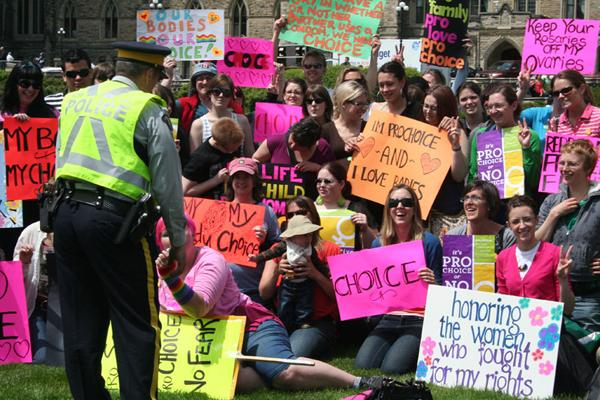The 40 Days for Life campaign, which opposes a woman’s right to an abortion, ended Oct 31. It is a powerful campaign that, for 40 days, had volunteers camped across the street from the Morgentaler Clinic, Ottawa’s only abortion clinic.
In contrast, the Pro-Choice Coalition of Ottawa (PCCO) is a small grassroots operation run by a few dedicated activists. Each year, during the protest, members of PCCO volunteer outside of Morgentaler Clinic and escort women inside.
Melanie Stafford, one of the active members of PCCO, describes the 40 Days campaign as an “organized schedule of harassment.” Stafford says that pro-life volunteers from other groups often join the 40 Days campaigners. They routinely attempt to prevent women from entering the clinic by handing out pamphlets, offering counselling or by physically stopping the women on the street.
This year, although PCCO members were present at the 40 Days campaign, Stafford says most of their energy has been channelled into advocacy work, fundraising and raising awareness of the city’s sanctioning of the anti-choice campaign.
In the province of British Columbia, as well as in cities like Calgary, Toronto and Hull, legislators have adopted bubble zones. The zones keep protesters from coming within a certain distance of the health clinics. It makes it an offence to interfere with or attempt to intimidate a patient or a doctor who provides abortion services.
Ottawa does not have any such restrictions.
“The city gives them a permit every time,” says Stafford. “The bubble zones are something that states very clearly that freedom of expression is not our only right. The one thing that we’ve got is that a women’s access to health actually trumps freedom of expression.”
The bubble zone dictates that anti-choice protesters remain at a distance of 50 metres from the abortion clinic. In Ottawa, the protesters are on the opposite side of the street and, every Friday at noon, a second group of protesters arrives and walks on the same side as the clinic.
Last year PCCO tried to target the bylaw regulations that issue permits to the protesters by launching a large letter-writing campaign to city council, but the only recognition they received was a letter of thanks.
This year, in response to the end of the anti-choice campaign, PCCO will hold a panel discussion called Bodies of Dissent. Their aim is to show people that women’s choice is more than just the abortion debate: it is about control over their own bodies and sexual justice.
“I know the intention is just to target the women going in to have their abortion,” says Stafford. “But, for me, they are there targeting all those of us who have bodies of dissent, bodies that are being matters of public opinion — these people have a say about our bodies.”
Bodies of Dissent will feature women activists with diverse points of view: Rayna Farr-Dutchin, an outspoken teenager who has been interviewed by Xtra about the abolition of the sex education curriculum; Jessica Yee, the founder and executive director of the Native Youth Sexual Health Network; a representative from POWER — Prostitutes of Ottawa-Gatineau Work Educate & Resist, an organization whose members self-identify as former or current sex workers; and Tomee Sojourner, who is described in her bio as “informed by her intersectional diversity, and her lived experiences as a Black, masculine-identified queer woman, educator, and social entrepreneur thriving with a learning disability.”
Bodies of Dissent is a discussion aimed at merging the different aspects of sexual justice.
“It is to try and bring the issues of abortion into a wider picture — to make the link of why all queer communities, sex workers, what are our relationships with each other with regards to this,” says Stafford.

 Why you can trust Xtra
Why you can trust Xtra


